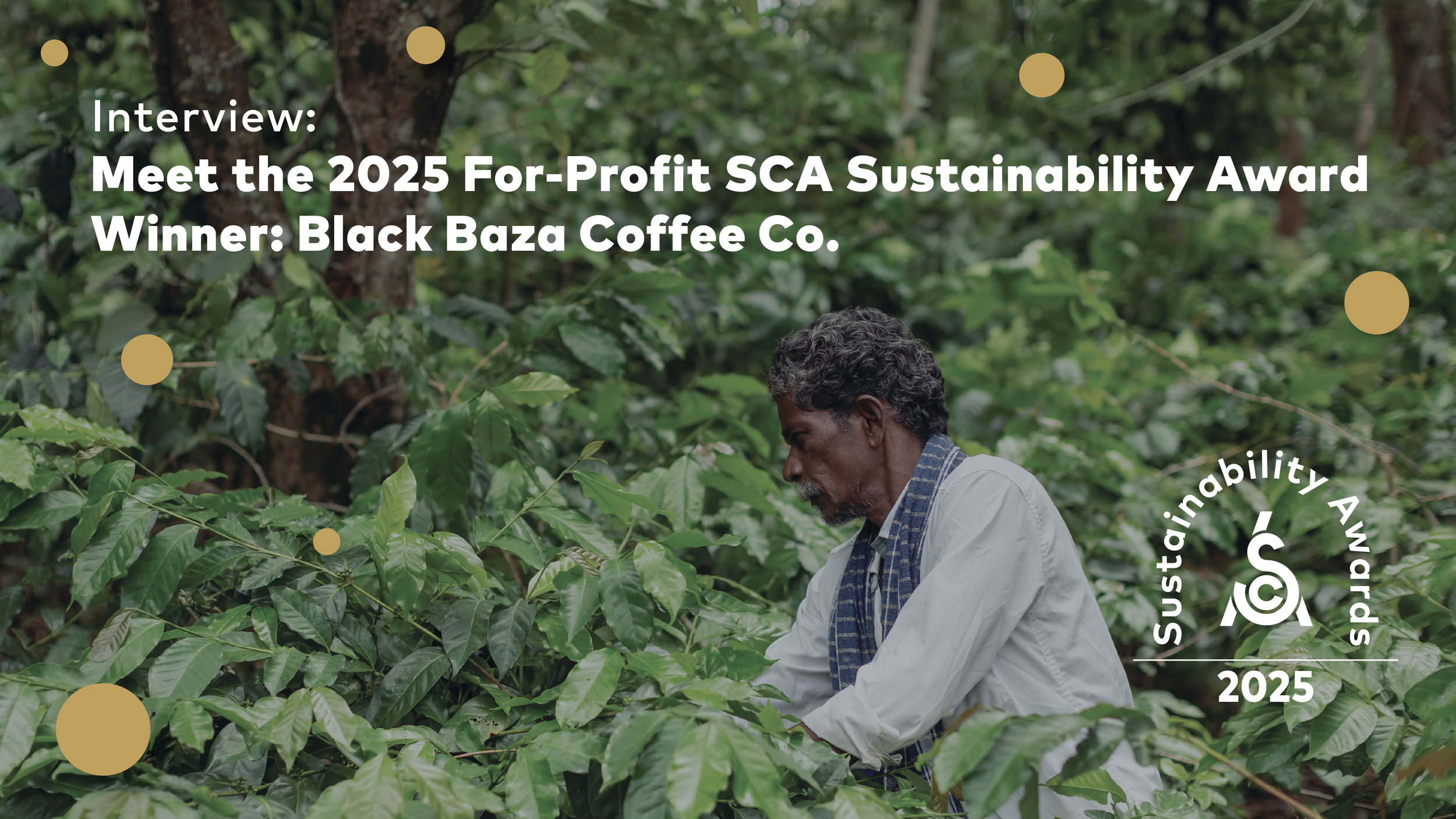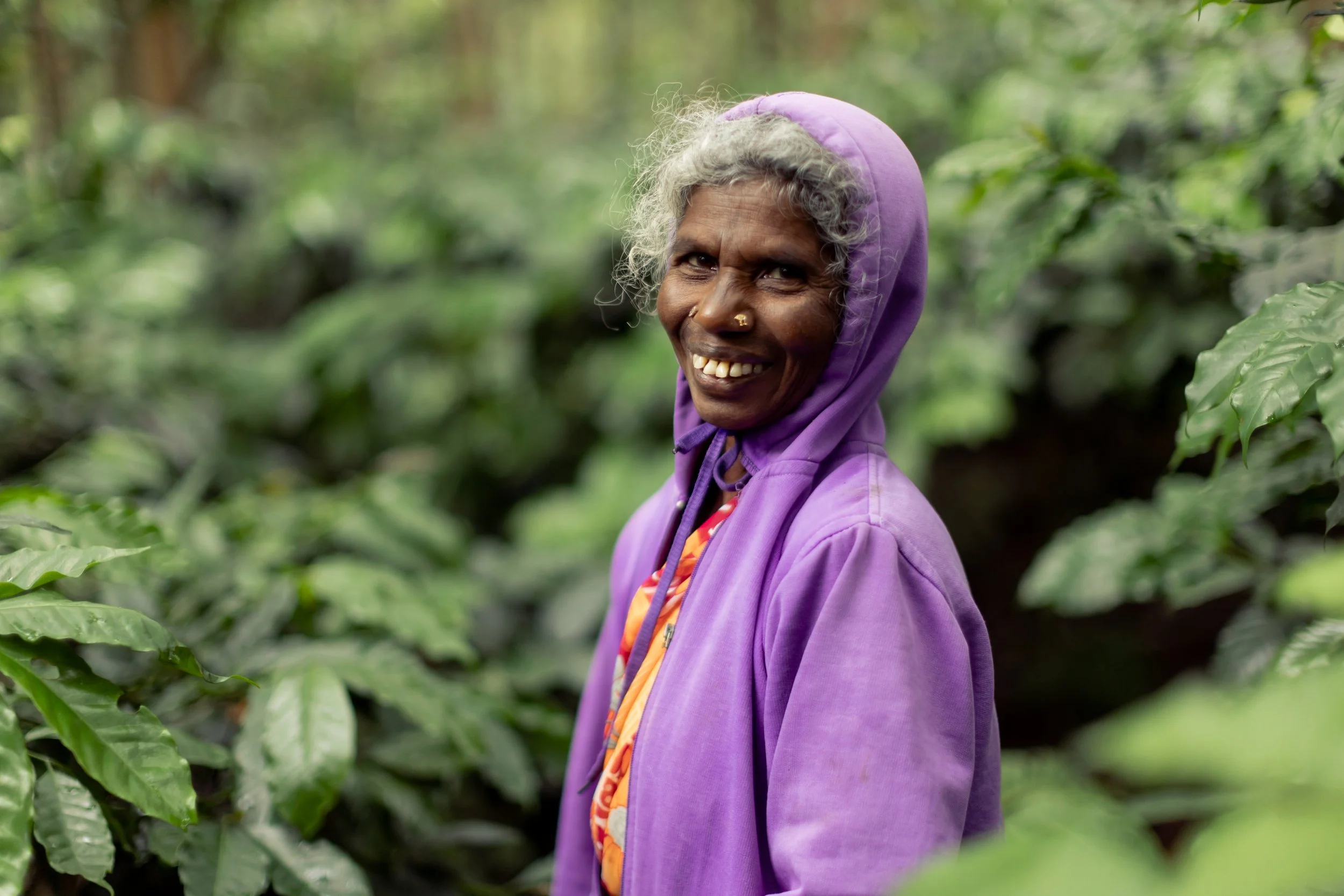Meet the 2025 For-Profit SCA Sustainability Award Winner: Black Baza Coffee Co.
LESLY NASSILA was delighted to speak with DR. ARSHIYA BOSE of Black Baza Coffee Co., the winner of the for-profit category in the 2025 SCA Sustainability Awards. Black Baza Coffee Co. is a self-described “activist company”, coffee roaster and green bean business based out of Bangalore, India. Founded by Dr. Arshiya Bose, this women-led enterprise seeks to reimagine the coffee value chain to ensure both people and nature can thrive.
The conversation covers how Black Baza Coffee Co.'s business model fosters biodiversity conservation through bottom-up approaches. At the heart of the company's work are farmers' voices: through the Farmer Climate Schools, coffee producers have a space to share knowledge and co-create solutions to climate challenges. Dr. Arshiya wants to convey to peers in the coffee industry that businesses can indeed thrive while tackling sustainability issues. Real impact, she argues, comes when sustainability is embedded in the very design of business, rather than treated as a nice-to-have.
This interview has been edited for length and clarity.
Lesly Nassila (LN): Dr. Arshiya, could you briefly introduce Black Baza Coffee Co.’s mission and vision?
Dr. Arshiya (DA): I founded Black Baza Coffee Co. 10 years ago. At Black Baza, we essentially look at bottom-up or participatory solutions to biodiversity conservation on coffee farms, in contrast to top-down approaches. We source coffee from 650 smallholder producers, however we reach a much larger number of producers through our capacity-building programmes: including village-level coffee festivals, gatherings, post-harvest training programmes, and dissemination of knowledge digitally via a community-led YouTube channel.
We work with producers in the Western Ghats mountain range, a biodiversity hotspot of India, where we try to conserve certain indicator species (a species that helps to signal the health of an ecosystem). The company then forward-buys the coffee from these smallholder producers and retails it to a number of different consumers across the world, either as roasted and ground coffee or as green coffee for export. All the coffee we work with comes from farms that have a lot of native shade tree species. Our goal is to make coffee farms a habitat for biodiversity, making them resemble forests as much as possible.
Kollegowda and Sannarangegowda discuss inclement rainfall and how they might respond as growers cultivating one acre land parcels. Image supplied by Black Baza Coffee Co.
LN: You already started touching upon it: how do you define sustainability? And how do you bring it into your practice at Black Baza Coffee Co.?
DA: For us at Black Baza, sustainability isn't something we think about at the end of a process. Although we are a for-profit business, the core idea of our business is to address biodiversity loss. As such, we think about sustainability in several ways.
The first consists of local conservation initiatives that aim to conserve specific indicator species. We actively restore areas by looking at how we can increase the number of native shade trees, the density and diversity of shade trees, and the complexity of the tree canopy. In many of the regions where we work, biodiversity takes refuge in coffee. As such our efforts go towards making coffee farms as close to wildlife habitat as possible.
The second way we look at sustainability is from the social and human angle. Because we work only with smallholder producers, we understand the kind of issues they face. Whether it's access to fair markets, finance, or training to build resilience to climate change, we run a lot of programs, including something called the Farmer Climate Schools, which essentially builds this kind of training for smallholder farmers.
What’s particular about Black Baza Coffee Co. is that coffee is just a means towards addressing many of these ecological and social concerns that we see in coffee landscapes. Addressing these issues came first; being a business came second. Sustainability is thus very much at the core of what we're trying to do.
LN: I want to ask about the Farmer Climate Schools. They seem like a great example of “co-creation of knowledge.” Could you share how the program promotes farmer-to-farmer exchange and traditional local knowledge?
DA: Extension programs and farmer trainings are prevalent in the coffee and other agricultural sectors, especially in the Global South. What’s happened in the process of doing that is that people have assumed that communities are backward, and that their knowledge is primitive and not valuable. In this mindset, the only knowledge that's worth valuing is coming from experts that have specific degrees or technical knowledge.
This top-down approach has actually caused more harm than good in many landscapes, including in India. From the early 1970s through the 1980s, there was a huge push towards the planting of fast-growing timber-valued exotic shade trees, which came to replace native shade trees. Many years later, farmers from indigenous communities tell us that these kinds of exotics are not good for the environment. They don't belong in the landscape, and few species depend on them. A lot of indigenous farmers knew this, but their knowledge was dismissed. We believe that the best knowledge is somewhere in the middle of what farmers already know—about climate change, seasonality, pests and disease management—and modern farming. We design the Farmer Climate Schools so that it's not just a one-way imparting of knowledge, but actually a way for farmers to have a conversation about what they're seeing and therefore what might be potential solutions. During Farmer Climate Schools, farmers from different regions come together for an intensive two weeks, where they can exchange information, share stories, and learn from each other.
LN: My next question is about value distribution. My understanding is that your model ensures that producers capture 44% of the retail price. How do you achieve this redistribution, and what kind of mechanisms sustain it?
DA: As a business, we’ve had to make choices about sales channels and pricing to achieve this redistribution. Being a small team also helps us limit overheads and sustain this. The whole point of Black Baza Coffee Co. is that farmers benefit, so a large share goes directly to them.
Madamma produces anaerobic natural coffees and the microlot premium that Black Baza offer has enabled her to pay back her debt. Photo supplied by Black Baza Coffee Co.
LN: Based on your approach to value distribution, what do you think are some principles that could inform guidelines on equitable value distribution?
DA: I think there are three ways to respond to this.
First, I think that guidelines usually don’t consider non-humans in a landscape. They often only consider producers. It is important to try and see what are the non-humans, and by that, I mean biodiversity: what does conserving or preserving that look like?
Second, the discussion, design, and definition of what we consider equitable must be co-created. It should not necessarily be a customer-driven thing where the customer is saying “this is what I want,” whereas actually, it should be producer-up.
Finally, if you want to have a genuine social or environmental impact on the farmers you work with or the ecosystems in which coffee is grown, I don't think it is possible to structurally keep the value chain the same. Doing business-as-usual and then thinking about what sustainability is as an after-thought is not possible in that case. It requires changes to how you fundamentally do business. The reason we set up the company as a for-profit is because we think that this is actually good supply chain management. We're very careful about how we maintain relationships with customers or vendors and so on. But it should be the same thing with producers.
Rangamma's biodiverse farm is home to coffee, barking deer, elephants, leopards and the occasional tiger! Photo supplied by Black Baza Coffee Co.
LN: Looking ahead, what kind of practices or trends give you confidence in a sustainable coffee future? And how do you hope this could translate into actionable practices?
DA: I'm just coming back from World of Coffee in Geneva, and one of the things that gives me the most hope is to see producers participating in those forums in such an engaging way compared to what was 10 years ago. It’s such a crucial step towards having a seat and a voice at the table. I also see very interesting gatherings emerging such as the Women-Powered Coffee Summit, another kind of very in-producer country focused conversations. So not only gatherings that are held in Europe and North America, but gatherings that are held in producing countries. That's the second part that gives me a lot of hope. And the third is that there's now a focus through various institutions on building capacity on post-harvest processing in producer countries. It's like producers training producers. I see a lot of that kind of movement and conversation around this that feels much more decentralized: it feels that that knowledge is accessible in a way that it wasn't. I think that these are also the three things that we should work more on.
LN: To close, what does winning the SCA Sustainability Award mean to you? And what do you hope to convey to peers in the coffee industry as well through that award?
DA: Sustainability is still seen as a good-to-have in for-profit businesses. What I want to convey is that it is, in fact, possible to run a profitable, successful coffee business, with producers and biodiversity at its core. I would like to see more businesses that don't think of sustainability as an afterthought, but really build it into the design of what the business is trying to achieve. The SCA Sustainability Award has given us so much confidence and validation: we've seen so much interest from different roasters across the world, who are so interested in what we're doing, keen to come and learn, but also to partner with us. That’s enabled us to think about what expanding and amplifying our impact means. For example, from working with 2,000 farmers today, how do we scale that to 10,000 farmers in a much shorter time? How can we make the most of doors that have opened up as a result of what the SCA is doing? Our goal is to be able to source from as many farmers as possible. We’ve been in some really engaging conversations that have allowed us to be able to source from more farmers, and therefore, increase our impact, which makes me super excited.
LESLY NASSILA is a PhD candidate in the Sustainability Research Group at the University of Basel. She studies how new human rights and environmental due diligence laws affect farmers and other actors in the coffee, cocoa, and palm oil value chains in Côte d’Ivoire.




